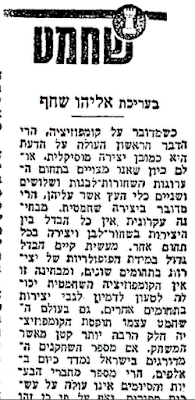 |
| Credit: Davar, 31.1.1980, p. 11 |
This is a quote from an article given to us by a frequent contributor to our blog. It is about the history [1940s-1960s] and present [1970s] article on the state of chess compositions in Israel and pre-state Palestine by Eliyahu Shahaf. The article deals, in particular, with the Israeli Problemists' Congress which took place in Rishon Le'Tziyon on Dec. 22nd [1979], which dealt both with showing the current achievements and reminiscences of the "old guard" -- including Shahaf himself, which met there Daniel Yitzhaki, and they spoke of their activity in the Palestinian Problemists' Association in pre-state days.
It is well worth reading for Hebrew speakers. For the English speaking readers of this blog, some interesting points Shahaf makes. Above all he notes that chess composition is an art, where aesthetics dominate over practical considerations -- but when a good problemist shows his achievments, the general view is that it's a pity he didn't use aesthetic talent for painting or some other field of art.
Some other points -- which show that problemists suffer from the same problems all over the world at all times, it seems:
1. Only technically [the use of the same board and pieces] are chess composition and chess play related. In reality they are two different fields. Cleverly, he notes that while it's quite true that chess composition is useless to the practical chess player, opening theory is similarly useless for the practical endgame or problem composer, yet nobody considers that a problem.
2. Israel is a chess composition world power [Ma'atzama], yet not only it is not appreciated by the public, it is hardly even known to the general public -- and even to many chess players. Even mention of composition achievements is missing, not only from the general press, but from most chess columns.
3. In Israel there were at the time thousands of registered chess players, but only a few dozens of problemists, which are -- for administrative reasons -- considered part of the Israeli Chess Federation, and suffer with it from lack of funding. But a lot of volunteer work and enthusiasm allow the publication of The Problemist, their magazine.
4. The Israeli Problemist Association had its start in the 1940s, as the Palestinian Problemist Association, but had become part of the ICF later on [under the name of "The Composition Committee"].
5. There are plans to write a new book on the history of problemists in the 1964-1980 period, to update Eliyahu Fasher's 1964 book Ha'Problemai Ha'Israeli [The Israeli Problemist]. [So far as I know this had not occurred - A. P.; however, only recently a book updating the achievements up to 2010 had been published.]
Some things never change, do they?
No comments:
Post a Comment